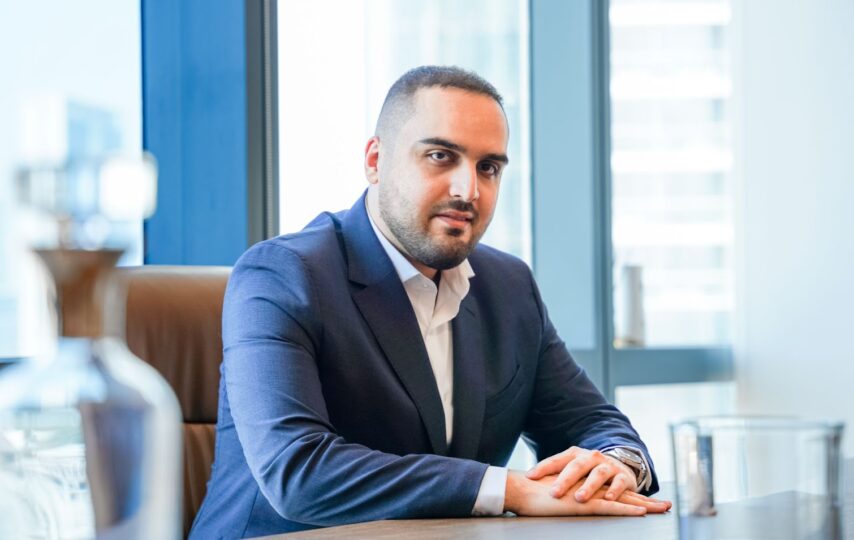Aminhossein Rad is one of the most well-known crypto entrepreneurs in the area, having started from nothing and rising to become a pioneer in the field.
Rad is the CEO of a cryptocurrency startup while having a degree in electrical engineering. He has honed his skills in a wide range of disciplines, including finance, banking, IT, marketing, and human resources management, by surviving in the cutting-edge and cutthroat sector of cryptocurrencies. Amin is proud of himself for playing a significant role in creating a thriving and successful crypto community in the United Arab Emirates. He along with other crypto businesspeople have slowly advanced and elevated the UAE to the forefront of this incredibly lucrative industry.
This Defi pioneer claims that due to their technological potential, digital assets like cryptocurrencies and NFTs have emerged as the most promising investment choice. Many people have started to recognize this, which is why these investment options are becoming so generally accepted. Aminhossein argues that “people have understood the potential of the digital asset space and are taking it as a better investment alternative than others, and that’s the reason this space is seeing an extraordinary spurt” while discussing the unexpected surge of investors surrounding this area.
Aminhossein, who is familiar with the wide universe of blockchain and cryptocurrencies, believes that investments in digital assets have tremendous opportunities and are certain to yield tremendous returns. He claims that when cryptocurrencies first appeared in the world of digital finance a decade ago, investors backed away from them because of the way they operated; but, over time, they proved to be successful and finally rose to the top of the investors’ list. It has been established that decentralized digital currencies outperform all other asset classes and are here to stay.
Aminhossein Rad is one of the few people who has followed the evolution of the crypto sector from the start. As a consequence, he has a detailed understanding of how it operates and has become a visionary dominant player.
However, why do people use OTC desks when centralized exchanges have lower rates, and what risks are associated with the industry? Rad reveals information about a part of the cryptocurrency industry that most retail traders are unaware of.
With his business, “Crypto Desk,” the gifted young entrepreneur seems unstoppable.
Aminhossein Rad is one of the pioneering cryptocurrency entrepreneurs in the UAE. Early in 2016, he entered this market by launching his cryptocurrency firm in the over-the-counter cryptocurrency brokerage market, which at the time was a quite novel endeavor. With confidence in his work, he established Crypto Desk with the intention of streamlining cryptocurrency buying and selling for businesses and individuals in the United Arab Emirates and educating them about the financial benefits
of adopting crypto transactions. Since then, he has served as the organization’s leader. His company has grown to become the most reputable B2B service provider in the nation, facilitating crypto payments and OTC services for more than 3000 corporates and institutions.
The most user-friendly cryptocurrency exchange platform in GCC, Crypto Desk, is situated in the heart of Dubai and offers competitive exchange rates and a healthy trade volume. The platform is the first and only OTC exchange in the world with no fees for exchanging more than 500 crypto coins. A unique service offered by the company is the facilitation of cryptocurrency payments for real estate transactions. Thousands of investors have used Crypto Desk to make bitcoin payments in order to buy their ideal Dubai real estate property.
One of the first businesses in the United Arab Emirates to be granted a crypto trading license by the relevant authorities, Crypto Desk helped to pave the way for the legal and compliant adoption of cryptocurrencies. The CEO of Crypto Desk, Aminhossein Rad, has been working to establish a thriving crypto ecosystem in the Emirates and among other crypto businesspeople. Rad anticipates that his localized business model will succeed all over the world because he thinks local exchanges have an advantage over their foreign rivals since they are more familiar with the rules and regulations of their own markets.
Since it is smaller and more personal than huge global trading platforms, Rad is optimistic about the OTC market’s future growth. For many, conducting large one-time purchases in person is more comfortable.
”Large amounts of money can vanish in an instance”
Due to anonymity and a lack of oversight or enforcement, the crypto asset business is not immune to widespread unethical behavior. Rad distinguishes between what he refers to as soft scams and hard scams after encountering a variety of frauds throughout his years in the business. The latter are more direct and targeted, whereas the former are things like indirect and impersonal rug-pulls.
In addition, because they are direct, relying on the mark’s trust rather than greed, and the money isn’t always an amount the victim can afford to lose, “the psychological impacts of hard scams are considerably more severe.” Rad continues by outlining the typical con.
Fake crypto coin scam
In a fake cryptocurrency scam, the scam artist sends the buyer a different, typically worthless coin that they believe to be the actual thing. Sending Bitcoin Cash or Ethereum Classic in place of Bitcoin or Ethereum could accomplish this. Frequently, it entails the production of a whole new token that,
when it enters the buyer’s MetaMask wallet, resembles the original token. Since Ethereum is an open platform, anyone can create any token they wish, such as USDTx in place of USDT, Rad emphasizes that this is simple to achieve. Check the smart contract to be certain. On the NFT marketplace OpenSea, where purchasers can deliberately place bids in USDC or Dai instead of ETH, a variation of this scam has been observed. An inexperienced or worn-out user can accept a bid of 79 Dai on their 80-ETH NFT and then learn too late that they are down by $250,000 since the Dai symbol can be mistaken for that of Ether. Although it is debatable whether such a transaction constitutes fraud in the legal sense because there is no observable deception, people who make such proposals in bad faith are obviously morally bankrupt.








